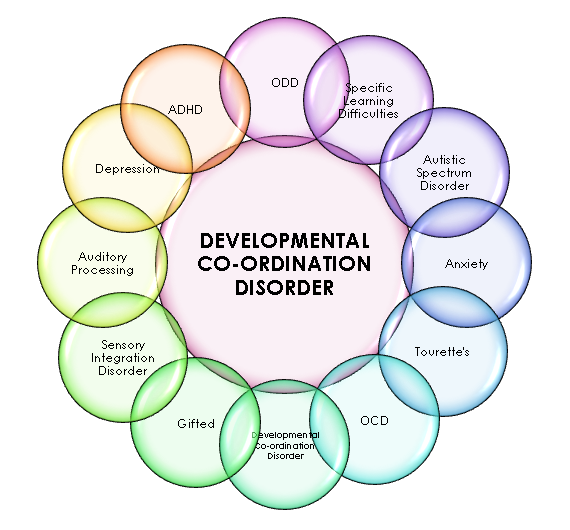Developmental Co-ordination Disorder

Many neurodevelopmental conditions can often exist together, but each can be treated in different ways. The picture below illustrates how the conditions overlap. Please use the drop down menu to view other conditions.
What Is Developmental Co-ordination Disorder?
Developmental co-ordination disorder (or DCD for short) is the umbrella term used to describe difficulties with control, organisation and planning of posture and movement which leads to poor motor co-ordination and impaired performance in carrying out motor activities.
Dyspraxia is a term that is often used interchangeably with DCD in the UK but in fact dyspraxia is just one type of DCD and not all children with DCD have dyspraxia. Other types of DCD include perceptual motor co-ordination disorder and disorder of motor control.
Dyspraxia affects the ability to plan and organise how to move the body; perceptual motor co-ordination disorder affects the processing and interpreting of visual information and disorder of motor control is largely due to postural instability which affects the ability to co-ordinate muscles to work together to maintain a position or posture.
All the disorders affect the ability to carry out every day motor activities in a smooth and co-ordinated way.
What Are The Symptoms Of DCD?
Motor difficulties, like attention difficulties have a pervasive effect on children’s lives, affecting them at school, home and in their leisure activities.
Children with DCD may have problems with their gross motor skills (movement or co-ordination of their arms and legs, posture and balance) or their fine motor skills (hand skills and manual dexterity) or both.
Gross motor difficulties include
- Difficulties riding a bike, catching or throwing a ball
- Difficulties with hopping and skipping
- Frequent trips and falls
- Awkward running
- Bumping into people/things, knocking things over
Fine motor difficulties include
- Poor pencil control leading to difficulties with drawing/writing
- Cutting with scissors
- Doing up buttons and zips or using a knife and fork together
- Tying shoelaces
Children with DCD may also have difficulties interacting with others, poor attention and organisation skills, poor time management skills and sensory processing difficulties. They are often frustrated and frequently develop low self esteem.
What Causes DCD?
DCD is thought to affect between 5 – 10% of the population, 2% severely with four times as many males as females. It sometimes runs in families.
As many as half the children with DCD also have ADHD and /or other developmental disorders such as autistic spectrum disorder.
Although some of the motor difficulties improve with age as the brain matures, approximately 70% go on to have some difficulties in adulthood.
How Is DCD Diagnosed?
DCD is assessed and diagnosed by either an occupational therapist (OT) or physiotherapist (PT) usually following assessment by a Paediatrician who will rule out neurological and other medical conditions which can cause motor skills difficulties, such as cerebral palsy.
What Is The Treatment For DCD?
There is no medication to treat or cure DCD but difficulties can be helped by
- home and school activity programmes to help the child practice and learn skills
- helping the child to develop coping strategies
- modifying the activity/environment e.g. providing pencil grips or for older children a laptop to enable them to record their work on computer
- individual or group therapy where needed
- maintaining a child’s self esteem



